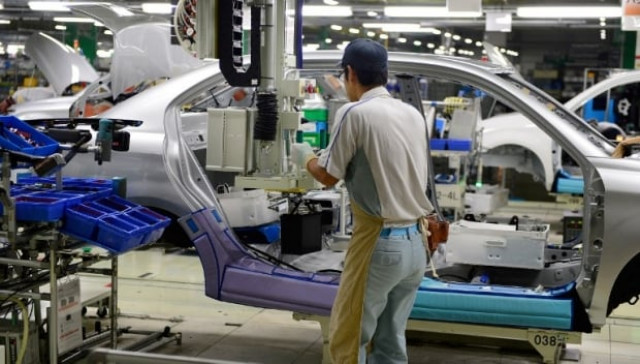Driving forward: 100% localisation can never be achieved, says Indus Motor chairman
Habib says feasibility major issue; wants govt to pursue consistency in policies.

PHOTO: AFP
“No country in the world, not even Indonesia or Thailand, makes 100% local cars not because it is not achievable but, because it does not make economic sense,” he said, while speaking to media at an event organised to mark the 25th anniversary of the company.
There are three carmakers in Pakistan and the highest percentage of localisation in any local car is about 75%. The localisation in Toyota Corolla – the flagship model of Indus Motor Company – is around 60%.
Economic viability is heavily scrutinised by car companies all over the world. To keep overall costs low, they procure parts from different countries or vendors as far as they meet quality standards, he added.
Citing an example, Habib said that Pakistan exports garments but it imports zippers from China mainly because of its low cost. In economic terms, this makes sense as economies of scale can make it possible to buy an imported product at a lower cost than producing it locally, he added.

“Pakistan has to do two things to overcome its problems of the auto industry — the first step is to go for a ‘make in Pakistan’ policy.
“We also need long-term, consistent policies so that new carmakers can enter the market here, increasing competition and providing the consumers with more choice.”
Replying to a question on full advanced payments on new cars, Habib said that Indus Motor does not take full payment at the time of car booking. “Taking full advance payments at the time of booking and then provide the vehicle in two to three months is unethical,” he said. “But yes, controlling this practice is possible through new laws.”
Habib defended scathing attacks on the local auto industry, saying that no car company in Pakistan is involved in such “unethical” practices.
While talking about the importance of manufacturing in Pakistan, the Indus Motor chief said that the auto industry generates enormous revenue, employs millions of people and therefore the ‘mother of all industries’ due to the value chain it creates.
He suggested that the government could consider reducing the percentage of general sales tax (GST) to cut down the overall car prices in the country. Out of the total cost of any local car, 33% are government taxes including 17% of GST.
Pakistan is set to become the 4th largest populated country by 2030 with a population of 240 million people. This presents a huge potential for growth of mobility in the country and the opportunity of providing employment for the growing youth, he added.
He urged the government to finalise the upcoming auto policy and decide how it wishes to pursue growth — through manufacturing or trading and look at the examples of neighbouring countries like India, Thailand and Indonesia.
Published in The Express Tribune, April 3rd, 2015.
Like Business on Facebook, follow @TribuneBiz on Twitter to stay informed and join in the conversation.


















COMMENTS
Comments are moderated and generally will be posted if they are on-topic and not abusive.
For more information, please see our Comments FAQ